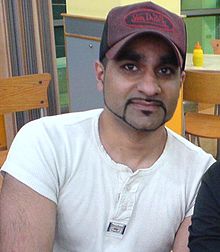 Another of the beauties of being a writer, is the way things lurk. For years, sometimes. Everything rolls along as normal, stories, novels, plays come and go, and some become pretty dormant, just lie there in the great outside, ignored and (maybe) festering.
Another of the beauties of being a writer, is the way things lurk. For years, sometimes. Everything rolls along as normal, stories, novels, plays come and go, and some become pretty dormant, just lie there in the great outside, ignored and (maybe) festering.
Then comes a communication, let’s say on Facebook. Facebook, for those of you who haven’t heard of it (!), is a way of keeping in touch with the wider reality. Pictures of Prime ministers and pigs, that sort of thing. Jokes about blondes and mirrors that you somehow feel you have no right to laugh at. Accounts of the latest NRA polemic proving that 3,000 gun deaths a year is an argument for arming babies in their prams.
About four months ago a man called Aneel Ahmad sent me a private FB message saying he’d always been a big fan of my early kids’ book My Mate Shofiq. He was a film-maker, and could we talk? At the very least he wanted me to sign his copy.
I wasn’t playing hard to get, but I’m usually too busy to efficiently wipe the crumbs from out of me beard. It was ages before I ‘messaged’ back, asking where he lived. Manchester. Nobbut (as they say in Oldham) a cockstride away. So to cut a long tale short, we met.
All of us, I imagine, have been in similar situations, and we all know how the bullshit radar works. So how about this for disarming? The bell rings, I open the door, and this man says: ‘Can I come in? I smell of curry, I’m afraid.’
It was Aneel Ahmad, and the greeting was an adaptation of something in my book. In My Mate Shofiq the co-hero, the white one, says ‘don’t like Pakis, me – they allus smell of curry.’ So in he came, both of us laughing like drains.
Aneel is a Pakistani, for want of a better language term. He was actually born in England, and has a classic Manchester accent (although he doesn’t pronounce it Manchestaw). What’s more, when he read Shofiq in school, he hated it.
‘Well, not exactly it, but the way it talked about us lot. Calling us Pakis, and so on. I thought that it was racist.’
‘And?’
‘The more I read it, the more I thought I might be wrong. In the end I’d changed my mind completely. When I grew up and got into making films, I knew I was going to try and make it one day. Now I think I can.’
His early reaction to the book, I must add, was not unusual. I was hung out to dry by some of the usual suspects (I won’t name them, and they all later saw what I was getting at) and ‘the trade’ was split down the middle. The sainted Kay Webb told my agent that she ‘had no intention of ever seeing’ a book like that on her list, while the sainted Rosemary Sandberg snapped it up. The difference between a Puffin and a Lion?
It was runner-up to that year’s Guardian Award, while other ‘peer panels’ were pretty snotty that it had even been submitted. Best of all, from a writer’s POV, I still get letters out of the blue from British Asians saying how much they love it.
Aneel, who is forty, has made many documentaries, many shorts, and is multi-talented. He showed me a selection of his small films (God bless the internet!) some of which he wrote, directed, produced, cast, located, and did the sound for. Two have been short-listed for awards.
Many of them are filmed in Pakistan, with locals he has ‘spotted in the street’ instead of professional actors, and to my western eyes, the depiction of genuine poverty and hardship is startling and heart-rending. One of them, Rickshaw Passenger, is about a rickshaw driver who falls in love with a ‘hotel girl’ (a sex worker). Her face alone (and she’s not an actress) is enough to make you weep with joy and sorrow.
‘I’ve been asked many times when I’m going to do a feature,’ he said, ‘but I didn’t think I was old enough at thirty five plus. And now I think I am. And it’s going to be My Mate Shofiq.’
‘Gosh,’ sez I (or words slightly to that effect). ‘Who’s going to write it?’
‘You, I hope,’ he said. ‘Is that a possibility?’
I pretended to look in my diary. Or rather, I pretended that I had one.
‘Well,’ I said. ‘Not this week. But after that…’
There is, as we all know, many a slip. Indeed. But we’re thinking very much on the same lines, and we can both do ‘Manchestaw.’ We’re also both agreed it should be a ‘period’ piece. Times have changed, and English racism is going through a very sticky period, extremely difficult to pin down.
But both of us are hopeful, both for racial problems and this film. So watch this space.
